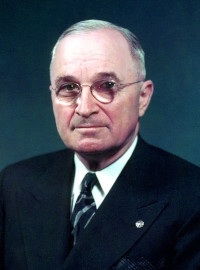
Harry S. Truman (1884-1972) was the 33rd president of the United States, serving from 1945 to 1953. A member of the Democratic Party, he previously served as a United States senator from Missouri from 1935 to 1945 and briefly as the 34th vice president in 1945 under Franklin D. Roosevelt. Assuming the presidency after Roosevelt's death, Truman implemented the Marshall Plan in the wake of World War II to rebuild the economy of Western Europe and established both the Truman Doctrine and NATO to contain the expansion of Soviet communism. He proposed numerous progressive domestic reforms, but few were enacted by the conservative coalition that dominated the Congress.
Born
Articles
Continues the examination of Machiavelli's The Prince, focusing on what he wrote about war and finding parallels with recent U.S. policy
Laments the dearth of poltical satire, as evidenced by Jon Stewart's backtracking on his answer about not having voted and recanting a 2009 comment about Harry Truman being a war criminal
Written on the 68th anniversary of the atomic bomb dropped on Nagasaki, discusses whether that bombing and the previous one at Hiroshima were really necessary and whether they should be considered war crimes
The introductory paragraph uses material from the Wikipedia article "Harry S. Truman" as of 7 Sep 2024, which is released under the Creative Commons Attribution-Share-Alike License 3.0.
